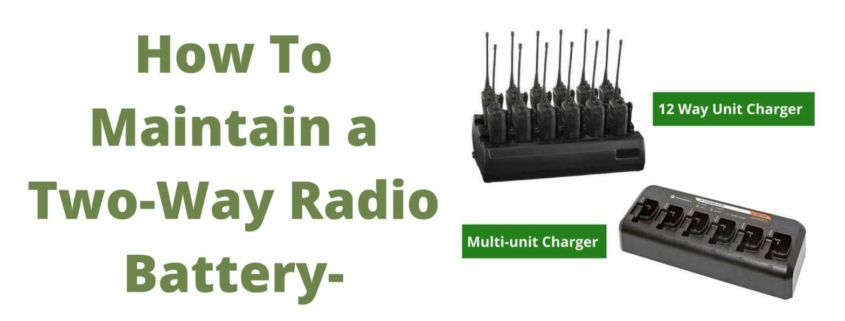How To Maintain a Two-Way Radio Battery
Taking care of your batteries is the first step in proper two-way radio maintenance. Batteries are often overlooked, as we place a two-way radio on the charger and forget about it. Managing a two-way radio battery will allow you to get the most out of each battery before purchasing new ones. In addition, your two-way radios’ health is dependent on healthy batteries.
Perfect guide on maintaining a Two-Way Radio Battery-
You must initialise your batteries properly-
As a safety precaution and since battery power diminishes over time, new two-way radio batteries come with almost half of their capacity charged. Therefore, it will drop below its maximum load when you start using the battery. Accordingly, before using your new battery, charge it overnight. This is known as initialising, and it allows you to get the most out of your battery.
Charge batteries only when they are completely depleted.
One of the worst habits we develop is putting two-way radios back on the charger at the end of a workday, regardless of how much energy they have. Instead, we should only charge two-way radio batteries when they are completely depleted.
Charging an empty two-way radio battery helps condition it, allowing it to last longer and get used up slower. Your two-way radio batteries can last 18 months when correctly managed and maintained. However, it would help if you replaced them when they lose efficacy or reach the 18-month mark.
You must use Battery Conditioners:
Every NiCad cell battery experiences a memory effect, and two-way radio batteries will not charge to total capacity if this occurs. Use a conditioning battery charger to avoid this. This charge is capable of detecting and correcting the problem. Consider thoroughly draining the battery before recharging if you can’t find a conditioning battery charger.
When the batteries are fully charged, remove them from the charging plug point-.
How often do you come into the room that has the two-way radio battery charger and have a completely charged light greet you? Do you unplug them from the charger? You should if you don’t already. Overcharging the battery has no benefit and may potentially cause damage.
With a trickle charge, automated shutdown, and built-in cooling, battery chargers help avoid heat damage. The two-line display on your charger indicates the serial number of a battery and its battery efficacy out of 100 per cent. When it falls below 60% efficiency, the charger alerts you with a flashing LED. When the battery is fully charged, the charger will turn down the current but continue to monitor it.
● Batteries Should Be Stored Properly
Your storage space should be kept dry and at a reasonable room temperature. A heated room or storing something hot, such as an oven, might be dangerous for the battery. In addition, cold storage conditions can cause batteries to drain charge more quickly.
Another aspect to consider for your battery storage is humidity. High humidity levels of more than 60% will affect the life of your batteries. Humidity ranges between 30 and 60% are ideal for storing two-way radio batteries.
It is essential to charge or drain a battery to approximately 50% of its capacity before storing it. After storing the batteries, you will lose some capacity, but maintaining the cells at a lower overall charge will minimise significant capacity loss.
The place where your two-way radio batteries are stored should be clear of anything combustible. If dust accumulates after a prolonged storage period, wipe it away with a clean, soft cloth. If you detect it, you may need to clean any chemical that has seeped into or leaked out of your battery supply.
● Clean your batteries and two-way radios regularly.
All across the world, first responders use two-way radios in harsh environments. Dust, ash, or soil might accumulate in the region around the battery or charger. Using a towel, keep your radios and batteries clean. If they contain grease or liquid stains, use at least 70% alcohol concentration isopropyl alcohol to remove them.
● It is a good idea to replace really old batteries-
Even the most well-maintained two-way radio batteries don’t last forever. Any batteries that are more than 18 months old should be replaced. Consider trustworthy manufacturers while looking for battery replacements. Remember to discard used batteries properly. According to the Environmental Protection Agency (EPA), Rechargeable batteries constitute a waste danger.
Batteries are manufactured to provide the best radio performance possible. Nonetheless, battery capacity gradually degrades over time. These two-way radio battery care guidelines are part of a larger strategy for two-way radio maintenance and troubleshooting that may keep your conversations via two-way radios clear and dependable in the future.



